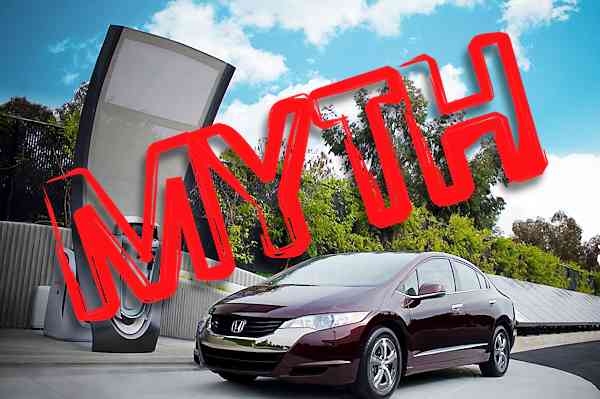
Over the years I’ve gotten quite a few comments regarding whether or not hydrogen fuel cell cars will contribute more to greenhouse gases (GHG) and global warming than their gasoline counterparts. Hydrogen car delayers and deniers state it as fact that H2 production and FCV’s will contribute more.
But I’ve also gotten a number of questions from well-meaning students who usually say something like this, “If hydrogen is produced and run through a fuel cell vehicle creating water vapor, won’t this greatly contribute to greenhouse gases?”
According to the California Fuel Cell Partnership, “Well-to-wheels studies look at fuel from production through consumption. All studies conclude that hydrogen used in a fuel cell vehicle has about 40% fewer GHGs than a gasoline hybrid. Only one production pathway produces more GHGs—using electricity from a coal-fired power plant to electrolyze water. However, most hydrogen from electrolysis is generated at the station usually using solar or wind energy, which has zero GHGs.”
The U. S. Department of Energy reiterates this point, “Relative to gasoline vehicles fueled by reformulated gasoline, hydrogen production for all fuel pathways creates fewer GHG emissions except when the fuel is produced by electrolysis from typical grid electricity.”
So, there you have it. If we throw out coal-fired electrolysis of water (which is a good idea) then hydrogen fuel cell vehicles are cleaner than their gasoline counterparts in every way imaginable.
Best hydrogen can do ever is about 60 mpge. PHEVS and EVs already get 100 mpge plus
Trends are all to a cleaner, renewable grid. Hydrogen from renewables is too inefficient
Hydrogen would come from methane – a fossil fuel, Electrolysis too expensive and inefficient
Hydrogen cost is $4 gallon equivalent
Hydrogen infrastructure is not affordable
Riding around in a vehicle with 2 tanks under 10,000 psi to convert hydrogen a clear, odorless, tasteless, explosive gas that cracks at its own fuel cells will never be accepted by the public.
PHEVs will be the transition to all-electric.
Hydrogen is DOA
James, I’ll address your points one by one:
• Hydrogen cars can do better than 60 mpge especially if a manufacturer comes out with a plug-in hybrid version (there are prototypes but not commercial versions). By the way, hydrogen cars are also hybrid vehicles (and are also electric vehicles).
• California mandates that at least 1/3 of hydrogen fueling stations use renewables to create the hydrogen. This number is expected to go up with companies like SunHydro using only solar power and ITM Power using mostly renewables.
• Hydrogen infrastructure is affordable.
• Hydrogen does not crack its own fuel cells. There have been millions of miles of road tests already with no exploding cars and no exploding hydrogen fueling stations. Toyota has even shot its cars’ hydrogen tanks with bullets and with no fires or explosions. Hydrogen is safer than gasoline.
• Hydrogen is anything but DOA as Hyundai has a commercial vehicle out now, Toyota is bringing one out in a couple of months and Honda will soon follow after that.